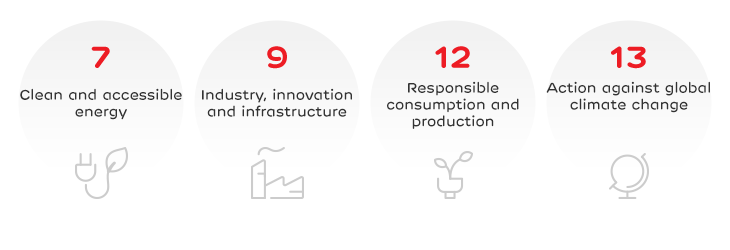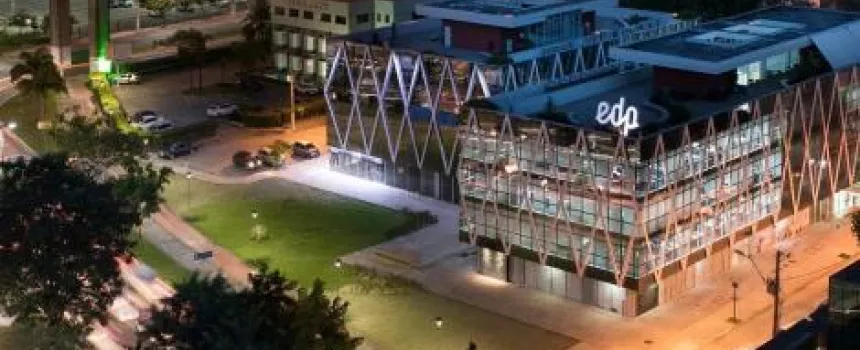Minimizing the environmental impacts of our activity is one of the fundamental pillars of our sustainability strategy.
EDP Brasil commits itself, through the Integrated Environment and Health and Safety Policy, continuing the improvement of environmental management.
EDP Brasil's Environmental Management System, based on ISO 14.001, guides the operations of all Group companies. Its processes and procedures are performed by local Environment teams in each Generation and Distribution unit, supported by the Sustainability and Corporate Environment area, responsible for policies and consolidation of practices and information.
In operational phases, procedures are carried out to verify impacts and environmental aspects within the scope of Environmental Management System. During the implementation period of the projects, environmental impact studies are carried out, compensation and impact mitigation programs are executed, as responsible licensing agencies defined.
All EDP operations have action plans to ensure that mitigation and compensation programs are developed and requirements of the bodies involved in the environmental licensing process are met.
Natural resources's lack demands a rational and sustainable use. Through the Innovation and Sustainability Policy, EDP is committed to promote the efficient use of these resources.
Water
Water is an essential resource for EDP's operations, being more relevant in the generation units, since it is the raw material for the production of energy in hydroelectric plants and the input of the cooling circuits of the thermoelectric plant. In this plant, water is used in production process, later is treated and returned to the environment following the standards established by the regulatory agencies.
The units of generation have programs directed to water resources, such as the monitoring of water quality and sediment.
Maintain the use and consumption of water's management is central to our Corporate Environmental Management System and to our relationship with our stakeholders.
To follow EDP Brasil's quarterly water consumption, access http://enbr.info.invest.com.br/ptb/releases-de-results.
Energy
The energy matrix of EDP Brasil is 75% composed of hydroelectric plants, a renewable source of energy generation. The other 15% of the Company's installed capacity corresponds to the Pecém thermoelectric plant, which generates energy from coal.
The acquisition of natural resource is determined according to market dynamics (price assessment), complying with appropriate environmental specifications. In order to reduce the environmental impact of coal burning, EDP Brasil seeks to optimize the consumption of fossil fuel by developing processes to improve burning, conducting preventive maintenance and research on new technologies to improve combustion efficiency.
Regarding the mitigation of environmental impacts in the energy chain, in the Distribution segment, EDP invests in combating losses, both those of technical origin and those resulting from fraud. The losses generate energy inefficiency that in addition to representing loss of revenue, generate emissions. In addition, the Company invests in energy efficiency of its administrative buildings, building infrastructures that privilege the incidence of natural light and equipping them with energy-saving appliances.
EDP Brasil also commits itself to reducing energy consumption in its customers, providing inefficient equipment exchange services and developing energy cogeneration projects from biomass through EDP Soluções em Energia.

Biodiversity
Through its Policy on Innovation and Sustainability, EDP is committed to regularly disseminating its performance in relation to biodiversity. The Company directs all business units to integrate the theme into their risk assessments, to develop practices to mitigate impacts, to promote scientific knowledge on the different aspects of biodiversity and to promote regular consultations with interested parties.
In Generation, the greatest environmental impacts occur during the construction period of the plants, and are accompanied by prevention, mitigation and compensation programs. Each plant in operation carries out impact reduction programs according to the particularities of its risks and factors of greater impact. The monitoring of the generating units is carried out by EDP's specialized teams, by specialized companies and contracted universities, as well as by environmental bodies.
In the Distribution operations, the environmental impact is due to the coexistence of the electric networks with tree species. The distribution units develop different programs of risk management and minimization of impacts according to the specificities of the region.
Ecosystem Services
Ecosystem services (SEs) are defined as benefits obtained directly or indirectly from nature. The main types of SEs are supply (products obtained from ecosystems), regulation (processes that regulate environmental conditions, such as plant regulation), support (which contribute to the production of other SEs, such as soil formation) and cultural (intangible benefits such as landscape beauty).
EDP impacts and depends on several of these ecosystem services in its operations. Therefore, it acts to minimize its negative impacts and maximize the positive impacts on the SEs, thus guaranteeing the quality and sustainable supply of these services. To improve management of this issue, EDP has identified and prioritized the main ecosystem services for its business.
Distribution Unit
| Provision | Wood and other wood fibers |
| Fibers and resins | |
| Regulation | Regulation of soil quality |
| Global climate regulation | |
| Regional/local climate regulation | |
| Regulation of air quality | |
| Support | Provision de habitat |
Hydro power generation unit
| Provision | Water |
| Productive fishing | |
| Wild fishing | |
| Regulation | Regional/local climate regulation |
| Regional/local climate regulation | |
| Regulation of water flows | |
| Erosion control | |
| Support | Retention and soil formation |
| Nutrient cycling | |
| Habitat Provision |
Thermal Generation Unit
| Provision | Water |
| Regulation | Regulation of Water Quality |
| Regional/local climate regulation | |
| Regional/local climate regulation | |
| Regulation da qualidade do ar |
Climate changes also impacts electricity sector. Therefore, EDP commits itself to corroborate with the transition to low carbon economy, mitigating the impact of its emissions.
Climate changes impacts all segments of the electricity sector. In Generation, its effects are felt through the impact of climate variables on water availability. Thus, in dry periods with low water availability - as in recent years - hydroelectric plants, which make up 61% of the installed capacity of the Brazilian energy matrix (according to ANEEL data) and 75% of EDP Brasil's portfolio, are severely affected. Faced with this scenario, it is necessary to activate thermal generation, which implies an increase in consumer tariffs. Climate changes also affects distribution because of the increase in occurrences of extreme weather events, such as storms and windstorms, which cause tree falls to increase the incidence of lightning strikes on the power grid.
In addition to being affected by climate change, EDP's operations also generate potential impacts on climate dynamics. That is why the Company integrates the theme into its guidelines and policies. The management of Climate Change at EDP Brasil involves a set of initiatives aimed at adapting and mitigating impacts, conducting an inventory of greenhouse gas emissions and guiding and monitoring all of the Company's business units related to aspects of emissions.
The risks and opportunities of climate change are evaluated and integrated into the business strategy, reflected in action plans that involve the measurement of impacts and diversification of operations through investments focused on energy efficiency and solar photovoltaic generation.

